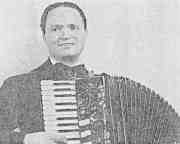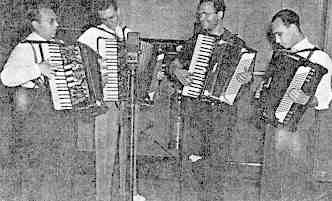
 The long-awaited, much heralded date at last arrived: April 18.
Carnegie Hall was in readiness for the event that was to loom large in
musical annals and in accordion history ... Only a vivid imagination can
appreciate the feeling of suspense and anxiety that must have been
experienced by the man on whose shoulders rested the responsibility for
the whole affair -- Charles Magnante. Would all the efforts of the past
months be rewarded by appreciation from music critics and serious
musicians, or would his attempt to establish the accordion on a new plane
be ridiculed?
The long-awaited, much heralded date at last arrived: April 18.
Carnegie Hall was in readiness for the event that was to loom large in
musical annals and in accordion history ... Only a vivid imagination can
appreciate the feeling of suspense and anxiety that must have been
experienced by the man on whose shoulders rested the responsibility for
the whole affair -- Charles Magnante. Would all the efforts of the past
months be rewarded by appreciation from music critics and serious
musicians, or would his attempt to establish the accordion on a new plane
be ridiculed?
The evening was a treacherous one. A heavy blanket of fog hung over New York City, making travel, even to cross a street, difficult and dangerous. Nevertheless by 8:30 scarcely a seat was left unfilled in Carnegie Hall. In the audience of three thousand people were representatives of New York's highest musical and social circles. The majority of the great crowd were already ardent Magnante fans, many were themselves professional or amateur accordionists, but there were some to whom this definitely was a new phase of music. They were waiting to "be Shown."

Crowds arriving in chartered busses (photo at right)
The time of starting arrived, and before this varied audience stepped Kelvin Keech, Commentator for the N.B.C. Studios. As an introduction to the playing, Mr. Keech spoke briefly on the outstanding accomplishments of Mr. Magnante and the members of the quartet: Joe Biviano, Abe Goldman and Gene von Hallberg.

When applause finally died away, Mr. Magnante took the stage alone and in his matchless style played "Malaguena" by Lecuona; Chopin's "Waltz in C# Minor" and "Nocturne Eb"; Kreisler's "Liebsfreud" and his own "Perpetual Motion." At the conclusion of the group he was recalled time after time to receive the plaudits of his listeners. There followed two duets by Mr. Magnante and Mr. Biviano. Then again the quartet appeared, this time to play "Danse des Bouffons" by Rimsky-Korsakov; "Danse de Mirlitons" by Tchaikovsky; Bach's "Fugue in G Minor;" and "Flight of the Bumble Bee" by Rimsky-Korsakov.
An intermission gave members of the audience a chance to look about and see some of their interesting neighbors, Frosini and Pietro shared a box and Anthony Galla-Rini and other noted players were surrounded by friends and admirers. Probably the record holder for long-distance travel was held by Mr. and Mrs. Bert Glassel of Saskatchewan, Canada, who covered the distance of 2000 miles solely for the purpose of attending.
The Editor and escort at Carnegie (photo at right)
The second half of the program, which was devoted to modern compositions, was opened by Mr. Magnante's rendition of a paraphrase on "Dark Eyes" and "The Carnival of Venice," and "On the Trail" by Grofe. Two new personalities were next introduced by Mr. Keech: Domenic and Anthony Mecca. These two brilliant young stars, who already have a wide following, won enthusiastic appreciation with their rendition of "Rhapsody in Blue" and Frosini's "Jolly Caballero."
Domenic and Anthony Mecca -- guest artists
Joe Biviano followed the Mecca Brothers as soloist, playing "Schoen Rosmarin" by Kreisler and "Dodging a Divorcee" by Forsythe. His sensitive interpretation of the former and sparkling execution of the latter elicited applause that recalled him to the stage again and again.
A final group by the Quartet, including "Mardi Gras" by Grofe; Magnante's well-loved "Accordiana" and a medley of Gershwin's numbers brought the brilliant program to a close.
The rousing ovation given Mr. Magnante and his assisting artists left no doubt as to the popular approval of the event. The one question remaining was: What would the critics say? The next day's newspapers told the story, and on these pages we reprint a few excerpts which tell the story of how critics as well as the general public were won over to the accordion as a musical instrument of the highest quality.
Accordionist Presents
Carnegie Hall Recital
Charles Magnante and His
Group Offer Familiar Music
Mainly familiar music was heard in a medium unfamiliar to concert auditoriums last night at Carnegie Hall, where Charles Magnante, an expert practitioner upon the accordion, gave his first New York recital.Mr. Magnante did notable work in illustrating the resources of his instrument from a technical and interpretative Point of view, displaying remarkable digital dexterity, clarity of medium and detail and an ample dynamic range and nicety of shading. His colleagues also gave meritorious performances in a concert which suggested that the accordion has more possibilities than are generally realized, but left room for a certain amount of doubt whether the color and range of the instrument is sufficient to sustain interest at an even pitch throughout a complete program. Kelvin Keech, a N.B.C. commentator, furnished oral program notes for a good-sized audience.
New York Journal-American
Charles Magnante Group Gives Accordion RecitalBy Grena Bennett
Charles Magnante revealed to a large audience last evening that the accordion is not necessarily limited to "swing" music but is also a medium for interpreting the greatest of classical compositions. He and his associates achieved some unusual and praiseworthy results in tonal combinations resembling in quality and character those of a small pipe organ. The technique of the accordion players was surprisingly brilliant and facile and suggested that of well-equipped pianists. The event was a diverting and worthy experiment.
New York World-Telegram
Accordion Program at CarnegieBy Robert C. Bagar
And last night Charles Magnante, ace radio accordionist, took over the glory-bound arena, in order to prove that the accordion is a musical instrument capable of doing justice to the greatest composers et al.
Had Assistants.
Mr. Magnante, not one to go in for half measures, had several other accordionists to assist him, principally Joe Biviano, Abe Goldman and Gene von Hallberg, who together with him constitute the Magnante Accordion Quartet. There were two other addicts, the Mecca brothers, Domenic and Anthony, and a string bass player, Paul Prinz. And to give the even an extra touch of elegance, Kelvin Kech, [sic] NBC announcer, made appropriate introductions and comments, via a public address system.
All in all the young artist and his cohorts provided a capacity audience with much enjoyment.
Valid Entertainment.
Musically there was valid entertainment for the gathering. As to the importance of the accordion, that, too, was tellingly established.
New York Sun
Accordion Recital Given By Charles MagnanteCarnegie Hall was the scene last night of an accordion recital by Charles Magnante, who was assisted by five other accordionists and by a player of the double bass. Mr. Magnante proved himself a virtuoso of his chosen instrument. In his solos he sometimes approximated a piano in his manner of presenting music that made unusual technical demands upon him. He played several of his own works as well as transcriptions of music by Chopin, Lecuona and Kriesler.
In an interesting effort to show the further possibilities of the accordion as a medium for art music, a quartet composed of Mr. Magnate, Abe Goldman, Gene von Hallberg and Joe Biviano, assisted by Paul Prinz, string bass, played Bach's Toccata and Fugue in D minor; Mendelssohn's Rondo Capriccioso and music by Rimsky-Korsakoff and Tchaikovsky, as well as some more popular works.
For those who prefer Gershwin to Bach, irrespective of the medium, Demic [sic] and Anthony Mecca gave a spirited performance of "Rhapsody in Blue." A large audience applauded with much enthusiasm. Kelvin Keech acted as commentator.
New York Post
Accordion Recital At Carnegie HallCharles Magnante, accordionist, offered an unusual and diverting program to a large audience at Carnegie Hall last night. The program made few concessions to the general conception of the accordion as a "popular" instrument. The selections ranged from the Bach Toccata and Fugue in D minor, through Mozart's "Marriage of Figar" Overture and Rimsky-Korsakov's "Dance of the Bouffons" to Gershwin's "Rhapsody in Blue." Mr. Magnante proved himself worthy of the greatest respect as a performer on his instrument.
New York Times
Magnante Gives RecitalCharles Magnante, accordionist, who has been heard often on the air and on records, gave a recital last night at Carnegie Hall. A large audience took pleasure in Mr. Magnante's virtuoso treatment of a varied program that contained classical and popular music in his own transcriptions.
Cue Magazine
Cue says Go!
Squeeze Box BachFor no very good reason, the piano accordion is usually associated, in the minds of many, with college reunions, trade association dinners, and barrooms. Charles Magnante has made up his mind that this shameful misconception must stop, and he's going to fire the opening gun in Carnegie Hall next Tuesday night.
By himself, with Mr. Biviano of his quartet, and with the whole quartet supported by a string bass, he'll fill the old hall with the lilting strains of pretty nearly everything from Johann Sebastian Bach to George Gershwin. It's the Bach that Mr. Magnante's proudest of , and the particular composition that he's elected to try his hand at is no less than the celebrated Toccata and Fugue in D Minor, specially arranged by himself for accordion quartet and one string bass.
1939 Magnante Concert at Carnegie Hall: Part 1 1939 Magnante Concert at Carnegie Hall: Part 2 The Classical Free-Reed, Inc. staff gratefully acknowledges volunteer Brian O'Boyle who assisted in the production of this article, as well as Stanley Darrow and his comprehensive American Accordion Musicological Society library.
Invitation to Contributors / Submission Guidelines Back to The Free-Reed Journal Contents Page Back to The Classical Free-Reed, Inc. Home Page